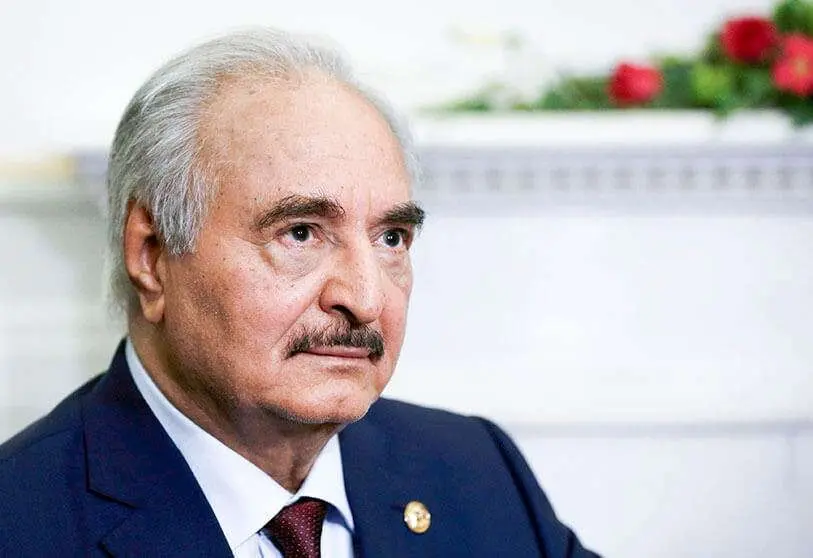Libya and the peace that never comes

The internal conflict in Libya continues and no short-term solution is in sight. The difference of positions between the Libyan National Army (LNA) and the National Accord Government (GNA) has opened a gap from which other foreign powers mainly benefit. The agreements and negotiations to find a peaceful solution to this conflict have not stopped in recent weeks. The latest one - between the LNA's commander-in-chief, Marshal Jalifa Haftar and South African President Cyril Ramaphosa - took place on Monday. In it, the two leaders discussed Ankara's "negative interference" in Libya's internal affairs.
Haftar and Ramaphosa, the current president of the African Union, also criticised Turkey's dispatch of thousands of mercenaries from northern Syria. "This situation threatens the region and feeds extremism and terrorism," they said in statements collected by Al Ain. "We will continue to fight," said the LNA's top representative. In this telephone conversation, Haftar and Ramaphosa discussed the role of the African Union in sponsoring the political process and concluded that in order to achieve peace in the North African nation and in the continent in general, it is necessary to bet on "intra-Libyan dialogue".
The AU President spoke to Haftar just a few hours after calling on the Egyptian President to "review the latest developments related to the Libyan conflict". According to Al Ain, the two presidents exchanged views on how to carry out negotiations within the framework of the Berlin Agreement and the initiative of the Cairo Declaration. This new roadmap drawn up by the two leaders aims to "undermine the dangers of terrorism, armed militias and external interference that threatens the security and stability of the region".

On the other hand, the Speaker of the House of Representatives of Libya, Aguila Saleh, arrived this Sunday in Morocco, to consult with the presidents of the two Houses of Parliament about his initiative to exit the crisis in Libya. The news agency of the Alaouite Kingdom said the Libyan leader was received by his Moroccan counterpart, Habib El Malki and the Libyan ambassador to Morocco, Abdelmajid Saif Al-Nassr.
Meanwhile, Ankara has continued to transfer Syrian mercenaries to Libya to swell the ranks of the GNA. The director of the Syrian Human Rights Observatory has reported that the Eurasian nation sent over 400 mercenaries to Libya last week and that another 250 returned to Syria during the same period, bringing the total number of Syrian mercenaries sent to Libya to 16,500. In recent weeks, speculation that Ankara might replace the Syrian mercenaries it sends to the North African nation with people of other nationalities such as Somalia or Yemen has only increased.
Ahmed al Mismari, spokesman for the Libyan National Army (LNA), said in an interview with Sky News Arabia that Ankara "has taken advantage of the ceasefire to send more mercenaries and weapons smuggled through commercial ships. In this sense, he criticized Turkey and Qatar for "not wanting to find any solution to end the Libyan crisis". In the same interview, Al Mismari accused the country led by Erdogan of using U.S. tanks and Hawk missile systems on Libyan soil, and warned that the LNA will work all that is necessary to "free Libya from colonialism and Turkish militias. "The first condition for a definitive ceasefire is the complete withdrawal of Turkey from Libya," he stressed.
Negotiations to find a peaceful solution to the conflict are ongoing, while the war between the GNA and the LNA is intensifying. In this spiral of instability, the LNA is supported by Jordan, Saudi Arabia, Egypt, the United Arab Emirates, Sudan and Russia; while the Tripoli government, backed by the Muslim Brotherhood and Italy and internationally recognized by the United Nations, receives military aid from Turkey and Qatar.

Control over resources has turned the conflict raging in the region into an open war over who gets control of the much prized black gold. Washington has threatened sanctions against Moscow's allies in the Middle East, a key energy region, according to the Wall Street Journal, which has reported that Haftar could be affected by such measures.
Meanwhile, the UN refugee agency, UNHCR, is concerned about the dramatic situation of several hundred Libyan families. This week, this institution expressed its deepest condolences for the death of a young Eritrean asylum seeker in Tripoli and criticised the deteriorating conditions of the thousands of migrants living in the North African nation. "We call on the international community to provide more support to the authorities in their fight against human trafficking networks," they said in an official statement.










